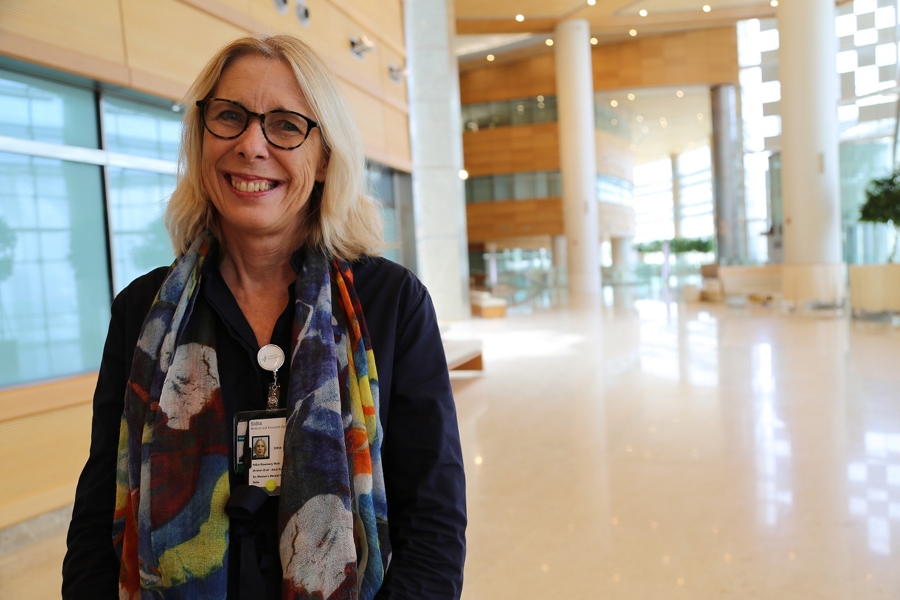QF Entity launches patient education leaflet in time for World Maternal Mental Health Day (6 May)
29 April 2020, Doha – Sidra Medicine, a member of Qatar Foundation, shares perinatal mental health advice for pregnant women and women who have recently had a baby during the COVID-19 pandemic.
Dr. Felice Watt, Div. Chief of Adult Psychiatry for Women's Mental Health at Sidra Medicine said: “While pregnancy and the period after having a baby is an emotional time, we have noticed increased levels of anxiety in many pregnant and postpartum women as well as their families during the COVID-19 pandemic. Anxiety is a normal response to a difficult, stressful or threatening situation, and there are some basic things that we can all do to maintain our mental and physical wellbeing during this pandemic.”
“In addition to proper hand washing and applying social and physical distancing, it is important that pregnant women or women who have recently given birth, are getting adequate sleep, eating well and exercising regularly. The support of family members is critical during this time. With the 6th of May this year observed as World Maternal Mental Health Day, to mark the occasion the Women’s Wellbeing Clinic at Sidra Medicine have prepared a leaflet offering guidance to pregnant and postpartum women in Qatar, on how to support their emotional well-being. We hope they and their families and friends will find the information useful,” continued Dr. Watt.
The perinatal mental health guidance leaflet can be viewed here.
Sidra Medicine suggests the following steps for women to manage their anxiety during pregnancy or if they have just given birth:
- Connecting
- Talk to your doctor or midwife during face to face or a telephone consultation and ask how you can contact them if you feel anxious or worried about yourself or your baby’s health. Ask if they can refer you for mental health support.
- Talk with your family and friends over the phone and through video calls. Make time each day to connect with someone you love and who you know is supportive.
- Stay away from disturbing social media and TV programs and request your friends and family to avoid sending you messages that are negative.
- Preparation and planning:
- Some women find it helpful to divide their day into four parts: rest, enjoyable activities, work and exercise. Set a certain time of the day for each part.
- Prepare a plan in case you need to visit the hospital urgently, including:
- Keep important phone numbers ready and easy to call such as: ambulance service, family and friends who you will need to call in case of emergency and let them know they are on your list.
- Once the baby is born keep the pediatricians or family doctors number accessible.
- Reducing anxious thoughts:
- Talk to someone. Not necessarily about your worries. Just chat about anything that will help you take your mind off things.
- Choose an enjoyable activity or allow yourself to be creative for example, reading, solving a puzzle, playing with your children, cooking a new recipe or craft work or writing a diary.
- If you feel overwhelmed, find ways to comfort yourself and remember the things that bring joy to your life. You could listen to soothing music, watch an enjoyable movie or show, try slow breathing, prayer, reading your holy book or other books with wise words.
- Relaxing and mindfulness:
- Find ways to relax such as: yoga, meditation, slow breathing, and mindfulness. You can practice them anywhere and anytime you prefer.
- The supporting role of family and friends:
- Family and friends can play a key role in supporting women during their prenatal and postpartum period by looking out for signs of worry or distress and listening to their concerns. Here are a few more recommendations:
- Encourage her to follow a routine and engage her in interesting conversations or activities (for example, playing a game, doing a crafts or cooking together).
- Discuss her plan for handling situations like: if she has pain, bleeding or goes into labor. Create a plan for support with baby care if isolation continues.
- As her husband, help her with baby care and ensure that she and her newborn baby get enough sleep.
- Some pregnancy and/or childbirth-related rituals may not be possible due to the social isolation requirements. Try to find simple and memorable ways to celebrate at home, such as creating a memory book of the baby’s first month, writing down messages from friends and family or get them to record music or lullabies or messages and send them to the mother and baby. These small activities will help the mother to feel connected even if her parents or husband or relatives cannot be nearby.
View the Arabic version of the leaflet here.
As with the current situation related to COVID-19, Sidra Medicine advices pregnant women to follow the instructions from Qatar’s Ministry of Public Health (MOPH) and call the hotline number 16000 if they have any COVID-19 related questions or concerns. The MOPH has designated certain hospitals to treat and care for people who have been diagnosed with COVID-19 including pregnant women who have contracted the virus. Please note that Sidra Medicine is not a COVID-19 hospital site and will not admit suspected or COVID-19 positive patients.
-ENDS-


